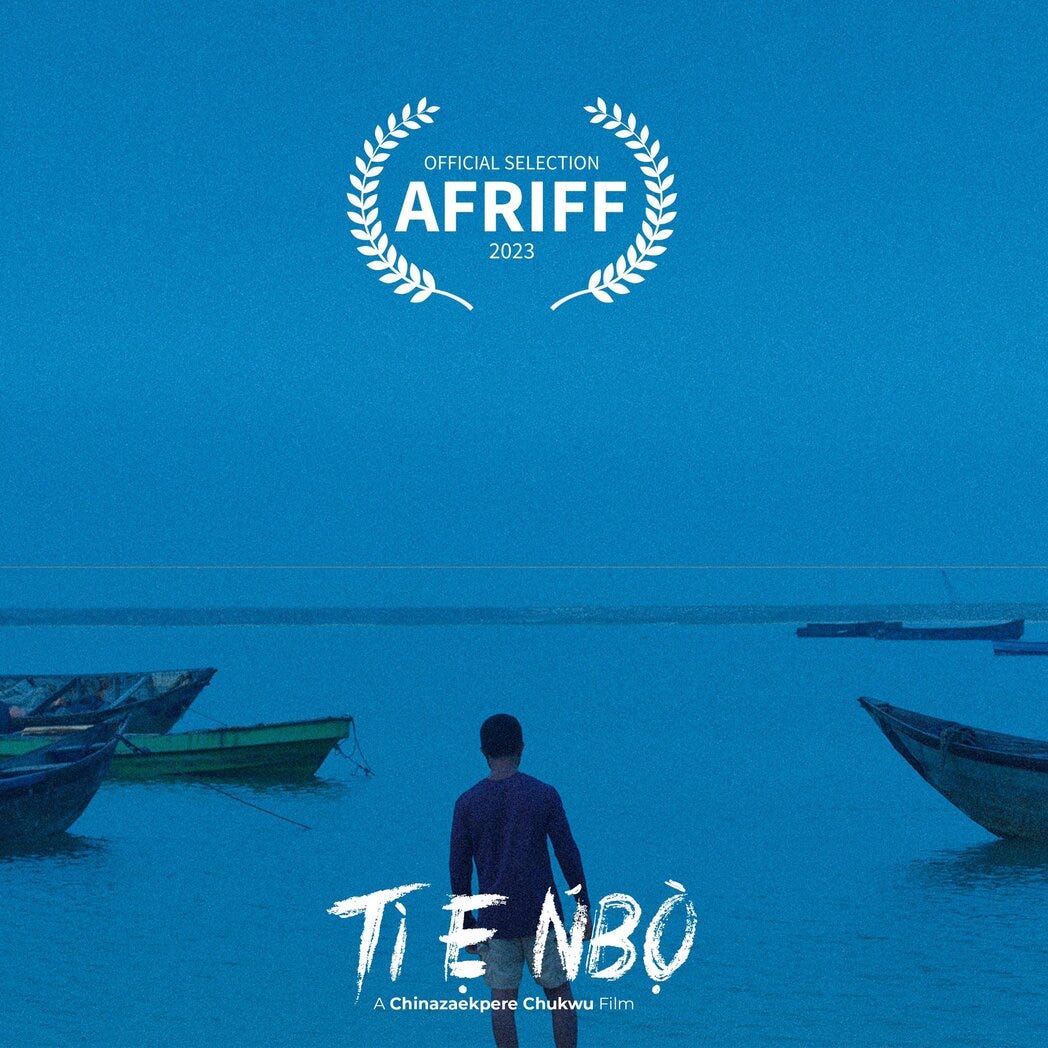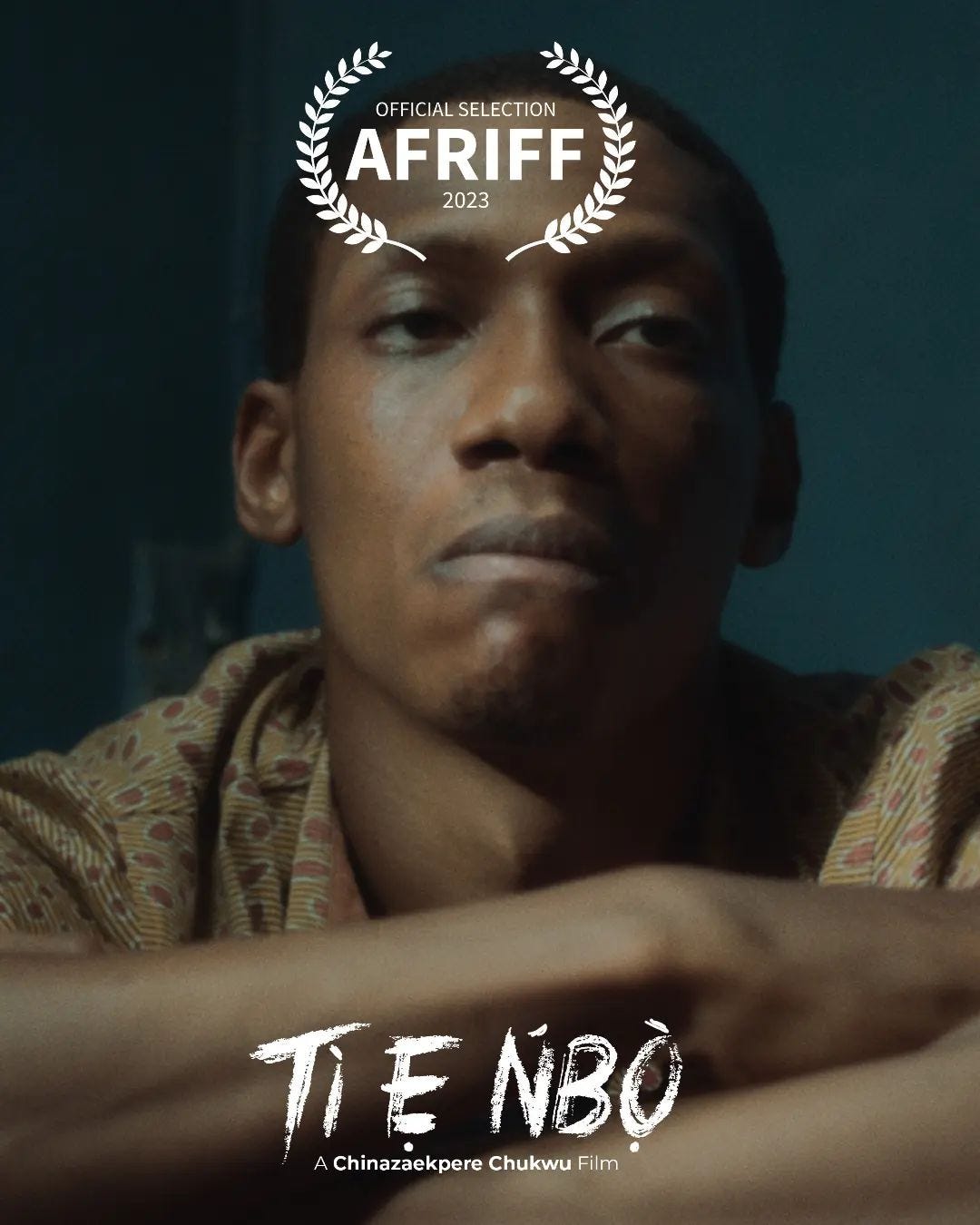AFRIFF Spotlight: Tì E Ńbò Tells A Story Of Resilience And Hope
Making a film about queerness in Nigeria is defiance in itself. While the Western conversation moves on to ask for lighter queer stories, we are just scratching the surface here.
In the first scene of Tì E Ńbò, a six-minute short film premiering at the Africa International Film Festival (AFRIFF) this Thursday, a man is sitting on a chair, his face cupped in his hands and his brows furrowed in worry that you will later discover to be anger. There is a painting-like quality to the scene. It looks like something you will find in a gallery, a portrait that will call on everyone to gather and discuss it. That is how most of the film unfolds, and that is also how my conversation with the makers unfolds.
The film is produced and directed by Bolaji Gelax and Chinazaekpere Chukwu, respectively. They join me alongside the lead actor, Nonso Ekemezie, in peeling back layers of the film’s journey, discussing their dedication to excellence and discovering how filmmaking, especially independent filmmaking, is a labour of love while bantering about the serial-killer quality of Ekemezie’s Google display photo.
The seed of the film was planted when the director Chinazaekepere, who is also the screenwriter, asked on Facebook if anyone had gone through conversion therapy, leading to her DMs getting flooded with harrowing experiences.
One of the stories stood out, and from there, Tì E Ńbò’s life began to take form. Making a film about queerness in Nigeria is a defiance in itself, the default response to its existence is violence, and while the Western conversation moves on to ask for lighter queer stories, we are just scratching the surface. It’s difficult to move on from the pain that is never addressed, but despite the dripping sadness of this film, there is still a delicate kind of hope threading the story.
Tolulope, one of the main characters, enters through the window after Ferami endures a brutal beating orchestrated by his father. With Aboniki in his pocket and one-half of the yin and yang circle hanging on his neck, Tolulope arrives to care for Ferami. Through his unwavering presence and a gentle touch on Ferami's injured shoulder, he expresses his love and support for him in this difficult time.
“The actual cut of the film is about twenty-five minutes,” Chinazaekepere tells In Nollywood when speaking on the weight of each moment in the film. “There’s a whole origin to the necklace and him coming through the window, but we had to cut it all out.”
She is constantly insisting on the humanity of the main characters during our conversation, and their refusal to be pulled down by the weight of their circumstances, a special manifestation of the way joy and hope are forms of resistance for queer people. The film directs itself to the family of these characters, quickly telling you that the man sitting at the beginning is Feranmi’s father and he is bent on changing his son. It extends itself beyond that known dynamic to subtly explore the ways fathers and mothers react differently to queerness: the fathers almost always bring the violence to the forefront while the mothers give an almost empathetic response.
After jokingly asking for the release of their own Snyder Cut, the director guides me through the tortuous process of editing the film. A kind of self-mutilation — she had to switch editors and let go of scenes she loved, giving props to Damilola Orimogunje, her film mentors, for being her guiding hands. The result is a potent potion of short scenes with little dialogue, one of the pivotal ones simply being Tolulope standing in the dark as his mother’s voice and figure come into frame. The scene is exactly how one’s life becomes when love is lost, and it almost didn’t happen.
“We scouted for locations and didn’t have any, so we had to improvise, that wasn’t how the scene was written. We saw a long passage with no light and then the DOP rearranged the passage and put just the character in the light,” Chinazaekepere tells In Nollywood.
“I literally screamed,” Bolaji adds.
Bolaji’s love for her role as a producer is palpable in this call. Early in her career, she has found something special: an ambition steeped in reality. “I’m going to help us achieve exactly what we want to do with the limited budget,” she says with an excited surety in her voice. Her belief in the film carried it to its finish line. Funds were sourced from friends and family, and Chinazaekepere’s japa funds were put into the project, but Bolaji extended her role as producer beyond finances. When Chinazaekpere felt like giving up and letting go of the project, Bolaji was there supporting and reassuring her.
“You have to find a producer that believes in you more than you believe in yourself,” she says, telling a story of when she had checked out of the project only for Bolaji to take her on location scouting and then pay for hotel rooms so they could begin shooting. There’s a synergy as they speak of their collaboration and even future plans: Chinazaekepere’s search for perfection and unconventional, creative approach are grounded by Bolaji’s belief and structure.
As they steadily entrench their place among the long history of female filmmakers in Nollywood, they are paying absolutely no attention to whatever negative thing anyone has to say about women in the industry. Their focus is on the future, and the stories that exist within them are many.
“We’re putting out quality work and you cannot stop the dynasty. Anywhere you find me, you’re sure to find her,” Chinazaekepere confidently says, and Bolaji concurs.
This synergy is tested when a pivotal scene at the beach where Feranmi is dunked head first countless times into the water almost caused a fight. “You owe me millions for that scene,” Ekemezie interjects with laughter.
He goes on to talk about having to trust Chinazaekepere’s direction despite him shivering with what might have been a bout of malaria as he navigated the cold waters of the beach during filming.
Ekemezie plays Feranmi with a softness that radiates from the screen. You feel every wince, every frown, while also admiring his steely resolve not to lose himself to his father. He is thoughtful with his answers when asked about how he captured multiplicities of Feranmi, acknowledging the importance of time (the script was given to him five months before shooting), the dedication to craft (he had to find a Yoruba speaker to translate correctly for his character), and the willingness to draw inspiration (he watched a few queer films like Moonlight and Call Me By Your Name when building the character).
“Wrapping the production up and going back home, I found myself in a certain kind of depression,” he says in one of the solemn moments of the conversation. “Playing Feranmi kind of multiplied the already existing empathy I have for queer people.”
The call winds down, and as I reflect on our conversation, I see within the excitement a tiny stream of vulnerability. These are young people who have decided to create in Nigeria, a country that sometimes is averse to creation. Chinazaekepere says that nobody wants to fail in their first film after film school, and Bolaji speaks of the people whose financial support made the film and how she didn’t want to disappoint them. This kind of pressure can break a person, but they were quick to emphasize the importance of community to the film. Behind the six minutes of the film are more than sixty people.





